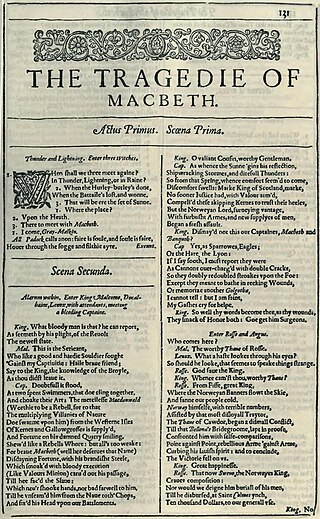
Macbeth is a tragedy by William Shakespeare. It is thought to have been first performed in 1606. It dramatises the damaging physical and psychological effects of political ambition on those who seek power. Of all the plays that Shakespeare wrote during the reign of James I, Macbeth most clearly reflects his relationship with King James, patron of Shakespeare's acting company. It was first published in the Folio of 1623, possibly from a prompt book, and is Shakespeare's shortest tragedy.

William Shakespeare was an English playwright, poet, and actor. He is widely regarded as the greatest writer in the English language and the world's pre-eminent dramatist. He is often called England's national poet and the "Bard of Avon". His extant works, including collaborations, consist of some 39 plays, 154 sonnets, three long narrative poems, and a few other verses, some of uncertain authorship. His plays have been translated into every major living language and are performed more often than those of any other playwright. Shakespeare remains arguably the most influential writer in the English language, and his works continue to be studied and reinterpreted.
A tetralogy is a compound work that is made up of four distinct works. The name comes from the Attic theater, in which a tetralogy was a group of three tragedies followed by a satyr play, all by one author, to be played in one sitting at the Dionysia as part of a competition.

In his own time, William Shakespeare (1564–1616) was rated as merely one among many talented playwrights and poets, but since the late 17th century has been considered the supreme playwright and poet of the English language.

Gruoch ingen Boite was a Scottish queen, the daughter of Boite mac Cináeda, son of Cináed II. The dates of her life are uncertain. She is most famous for being the wife and queen of MacBethad mac Findlaích (Macbeth), as well as through the character of Lady Macbeth in Shakespeare's Macbeth. However, Shakespeare's Macbeth is based on Holinshed's Chronicles and is not historically accurate.
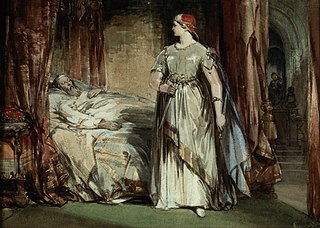
Lady Macbeth is a leading character in William Shakespeare's tragedy Macbeth. As the wife of the play's tragic hero, Macbeth, Lady Macbeth goads her husband into committing regicide, after which she becomes queen of Scotland. Some regard her as becoming more powerful than Macbeth when she does this, because she is able to manipulate him into doing what she wants. After Macbeth becomes a murderous tyrant, she is driven to madness by guilt over their crimes and kills herself offstage.
Fleance is a figure in legendary Scottish history. He was depicted by 16th-century historians as the son of Lord Banquo, Thane of Lochaber, and the ancestor of the kings of the House of Stuart. Fleance is best known as a character in William Shakespeare's play Macbeth, in which the Three Witches prophesy that Banquo's descendants shall be kings. Some screen adaptations of the story expand on Fleance's role by showing his return to the kingdom after Macbeth's death.

David Martin Bevington was an American literary scholar. He was the Phyllis Fay Horton Distinguished Service Professor Emeritus in the Humanities and in English Language & Literature, Comparative Literature, and the college at the University of Chicago, where he taught since 1967, as well as chair of Theatre and Performance Studies. "One of the most learned and devoted of Shakespeareans," so called by Harold Bloom, he specialized in British drama of the Renaissance, and edited and introduced the complete works of William Shakespeare in both the 29-volume, Bantam Classics paperback editions and the single-volume Longman edition. After accomplishing this feat, Bevington was often cited as the only living scholar to have personally edited Shakespeare's complete corpus.
Stephen Booth was a professor of English literature at the University of California, Berkeley. He was a leading Shakespearean scholar.

Shakespeare's plays are a canon of approximately 39 dramatic works written by the English poet, playwright, and actor William Shakespeare. The exact number of plays as well as their classifications as tragedy, history, comedy, or otherwise is a matter of scholarly debate. Shakespeare's plays are widely regarded as among the greatest in the English language and are continually performed around the world. The plays have been translated into every major living language.
Macbeth is a play by William Shakespeare.

David Rintoul is a Scottish stage and television actor. Rintoul was born in Aberdeen, Scotland. He studied at the University of Edinburgh, and won a scholarship to study at the Royal Academy of Dramatic Art in London.
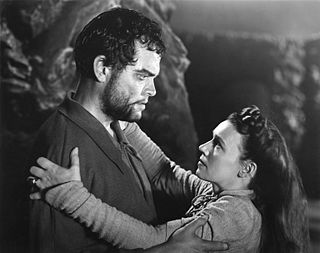
Lord Macbeth, the Thane of Glamis and quickly the Thane of Cawdor, is the title character and main protagonist in William Shakespeare's Macbeth. The character is loosely based on the historical king Macbeth of Scotland and is derived largely from the account in Holinshed's Chronicles (1577), a compilation of British history.
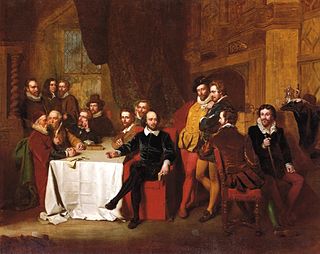
William Shakespeare's style of writing was borrowed from the conventions of the day and adapted to his needs.
Andrew James Hartley is a British-born American novelist, who writes fiction for children and adults. He also writes thrillers as Andrew Hart.

The Three Witches, also known as the Weird Sisters or Wayward Sisters, are characters in William Shakespeare's play Macbeth. The witches eventually lead Macbeth to his demise, and they hold a striking resemblance to the three Fates of classical mythology. Their origin lies in Holinshed's Chronicles (1587), a history of England, Scotland and Ireland. Other possible sources, apart from Shakespeare, include British folklore, contemporary treatises on witchcraft as King James VI of Scotland's Daemonologie, the Witch of Endor from the Bible, the Norns of Norse mythology, and ancient classical myths of the Fates: the Greek Moirai and the Roman Parcae.

Rowan David Oakes is a British actor. He is best known for his roles in the series The Pillars of the Earth, The Borgias, The White Queen, Victoria, Vikings: Valhalla, and for his discursive Natural History podcast, Trees A Crowd.

The Coachman Rat is an alternative account of the classic fairy tale Cinderella. It was published in 1989 and written by children's author David Henry Wilson.

The Third Murderer is a character in William Shakespeare's tragedy Macbeth (1606). He appears in one scene (3.3), joining the First and Second Murderers to assassinate Banquo and Fleance, at the orders of Macbeth.
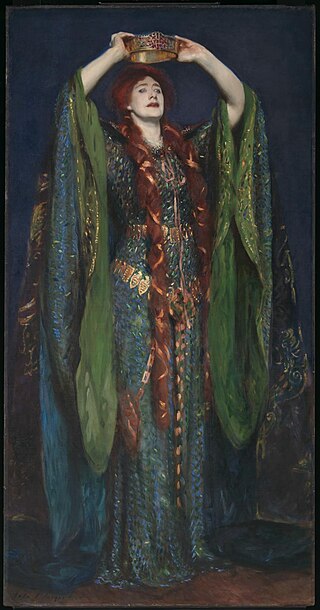
The tragic play Macbeth by William Shakespeare has appeared and been reinterpreted in many forms of art and culture since it was written in the early 17th century.













